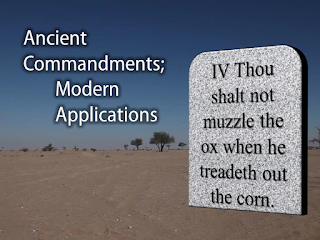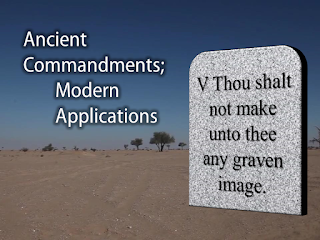Hespeler, 28 August, 2016 © Scott McAndless
1 Corinthians 9:1-14, Deuteronomy 25:4, Psalm 8
he Bible, especially the Old Testament, is just chock full of rules, laws and commandments. They speak to every sort of situation and moral decision but, I’ve got to admit, I have always had a soft spot for those particular commandments that get very specific about the situation. The commandment that we read this morning about not muzzling your ox is a great example, but there is an even better one a few verses after that one.
The commandment goes like this: “If men get into a fight with one another, and the wife of one intervenes to rescue her husband from the grip of his opponent by reaching out and seizing his...” Okay, I just remembered why we don’t usually talk about this commandment. Let’s just say that she grabs him in a very specific place and leave it at that. But my point isn’t about where she grabs him. It is about how very specific the law is. It is so specific, in fact, that it seems extremely likely that this law was actually written in response to an actual incident. I mean, at some point there were two actual men fighting and the wife of one of them did some specific grabbing and someone was trying to figure out what the specific and reasonable punishment for that action was.

This particular commandment probably represents an actual judgement that was made in a particular case and it got recorded in the scriptures. (And, just for the record, I don’t find the judgement that is made to be particularly reasonable, as the woman ends up losing her hand, but that, also, is a whole other discussion.)
My question is this: what is the application of a very specific commandment like this? I mean, you are fine if the exact same situation arises in exactly the same way again; then you know what to do. But what if the circumstances aren’t exactly the same. What if three men are fighting instead of two? Do we need a whole different commandment to deal with that situation? And what if the woman doesn’t intentionally grab? What if she just brushes something accidentally? Is that a different case entirely? These are the sort of questions that you are often left with when you write you commandments that apply too specifically to certain situations.
And I think that these sorts of questions become more important when we turn from fighting men to the commandment that comes a few verses before it that we read this morning: “You shall not muzzle an ox while it is treading out the grain.” This is a very specific commandment, but the situation that it speaks to was one that the people who first heard this commandment ran into a lot. You see, most of them were farmers and most of them grew grains like wheat or barley. And when you harvest grain, there are three key steps. You first cut the grain. Then you thresh it by beating the grain with something hard to loosen the chaff that covers the kernel. Then you winnow it or separate the kernels from the chaff, often by throwing it all into the air so that the wind can blow the chaff away while the kernels fall back to the ground.
But sometimes, with certain grains, it could take an awful lot of force to break the chaff away and so one of the best ways to accomplish that was by getting a big, heavy animal with hard hooves (like an ox) to step on it. This was called treading out the grain and it was a very common way to thresh your grain at harvest time.
So what we have in this commandment is a very specific regulation regarding how you ought to treat your ox while it was treading out your grain because, of course, there was an immediate problem whenever you did that. Oxen eat grain. They love it. So it is only natural for your ox to start snacking away at your crop while you are making it tread out your grain. You can see why you might want to prevent that by muzzling your ox while it is treading but this commandment says no, you cannot do that.
And I have absolutely no problem with this commandment. It seems all very reasonable to me that, if you are making your ox work that hard to harvest your crop, why not let him steal a few bites of good food along the way? My only problem is that it is so very specific. What happens, for example, if you don’t have an ox and use another animal to tread your grain: a horse, a cow or a bull? The command only says ox, so can you muzzle those other animals?
And, of course, since modern farmers don’t use animals to tread their grain at all but instead use a machine called a combine, that does all the cutting, threshing and winnowing at once, you could certainly argue that there is no modern application of the commandment. This commandment would therefore have no meaning or application for us today at all.
So is that correct? If we no longer do the specific thing that the commandment is talking about, we can just forget it? Does it simply not apply anymore? We’ll I don’t believe so. Yes, the world has changed and changed a great deal since the Bible was first written, and, while we may no longer live in the same way that the people in the Bible did, I will always believe that there are principles in these very specific commandments that still apply today.
On a very simple level, I am sure we would all agree that there is a principle at stake in this commandment concerning muzzling oxen that we can take and apply today. To not muzzle an ox while it is treading is to think about the needs of that ox. It is a way of being kind and not being cruel. So I don’t think that it would be an unreasonable application of this command to say that it teaches us that animal cruelty is wrong and that we should treat all animals who do anything for us with whatever kindness we can.
The Apostle Paul, was not a farmer who used oxen to tread his grain, but he read this commandment some fifteen hundred years after the time of Moses and clearly saw that it still had applications to his life. In fact, Paul read it and asked the question, “Is it for oxen that God is concerned?”
He was asking a rhetorical question. He was assuming that his readers would respond by saying, “No, Paul, of course God doesn’t really care about oxen.”
I am not so sure about that. I happen to believe that God’s compassion is not limited by anything and that God is just as capable of being concerned for oxen as God is for human beings. But Paul’s rhetorical question isn’t really about the welfare of oxen, it is a way of opening up the application of the commandment beyond oxen.
Paul suggests that the commandment applies to a situation he has been struggling with. He says that it applies to how sometimes people in his position, people who are preaching the gospel and offering leadership in the church, need support from the church to be able to continue to do what they do. Here they are, working hard, treading out the grain as it were, and are you going to deny them the opportunity to benefit from that work by eating some of the grain that they are threshing? Of course not.
And, of course, Paul’s application of this commandment is legitimate. It is okay to make the connection that, since God seems to care about oxen getting some benefit from their labour, God must also care about people who are working for the sake of the kingdom of God getting some benefit from their labour.
But you need to realize that Paul’s application of this commandment to the situation of people who work for the church also opens a can of worms. Do you realize that we are living today in a world where the very notion that people ought to be able to benefit from the fruit of their labour has become something of a controversial idea? Now, it shouldn’t be. It should be obvious that, when people work hard for anything worthwhile, they ought to be the first ones who get the benefit. But the world doesn’t always seem to work that way.
In fact, increasingly our world is set up according to a system where we are very careful to make sure that certain people get the benefit of the labour that is done, but those people are not necessarily the people who do the labouring. We have actually entered a time where we give priority, not to labour, but to investment. Much of the business and political world is oriented towards making sure of one thing above all: that those who invest money in various enterprises are the first to be able to profit from it.
It is actually amazing to think that we are living in an age when it is possible for someone to work at a full time job (or several part-time jobs) and be working 30, 40, 50 hours a week and not be earning enough to pay their rent and cover their expenses. Meanwhile, it is taken as a given that people who invest lots of money in things can get very rich without doing any labour at all – profiting, over all, from the labour of other people who may very well be underpaid.
And I realize, of course, that economic matters can be very complicated and if investors didn’t get good returns on their investments, they wouldn’t put money into them in the first place and then there wouldn’t even be jobs for people to work at and be underpaid. We do need people who are willing to invest in new enterprises and these investments do create a lot of good.
But I do think that we have a problem when you create situations where people are working hard and are still not getting enough benefit from their labours to make ends meet. I think that some of the balance between the needs of the labourers and the needs of the investors is off in our world today and that it may be time reset that balance.
Who are the oxen in our world today who are being muzzled, who are not receiving the benefit from their own labour that they deserve. In some cases, it may be the women who do the same job as men and who work just as hard at it (or maybe harder) and, according to statistics in Ontario are paid 31.5% less than their male counterparts.
In some cases the muzzled oxen may be the temporary foreign workers – agricultural workers for example – who everyone agrees work harder than Canadians usually doing jobs that Canadians won’t do. They are paid, of course, and usually better paid than they would be in their country of origin, but there are often other issues we shouldn’t ignore, especially when they do not enjoy the protections and security that they need.
Undoubtedly, the muzzled oxen in our world today may include the people in developing countries who make our clothing and shoes and assemble our electronics in conditions that are not safe for wages that keep them virtual indentured servants. Somebody is profiting from their labour, profiting very handsomely, but it is not the people who are doing the hard work.
These are but a few examples but I think they are important ones and they are a reminder to us that this ancient law constructed for a situation that simply does not arise in modern life still may have important things to say to us today.
#140CharacterSermon Don't muzzle your ox while it's treading grain! Specific commands like that may still say important things to say to us





